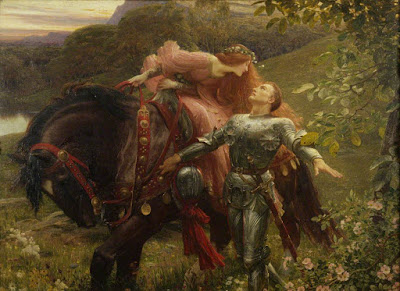So it stands to reason that when one of them does, she is vividly remembered.
Linette, the razor-tongued sister of Lady Lionors, is unique among the ladies of Arthuriana not only because she gets everything she set out to get, but because she is one of the only successful cases of character development in the legends. So many characters spring to life already equipped with their defining personality traits: Lancelot is noble and has a guilt complex, Mordred is evil and scheming, Merlin is wise, Guinevere is beautiful and capricious. We see Arthur develop in the early going from impulsive youth to mature and just king, but he's pretty much the only one.
 |
| Sir Gareth and Lady Lynette, Arthur Rackham |
And then she gets her wake-up call. The second of four knights that Gareth trounces is a real gentleman, inviting his ex-foe and his companions to dinner. Linette does her usual awful shtick; unlike Gareth (who handles his crappy damsel with true chivalry), the defeated knight calls her on it. And suddenly Linette realizes she's been a complete hag to the one man who was willing to help her sister.
For comparison: Lancelot gets a similar wake-up call on the Grail Quest, when his sinful love for Guinevere bars him even from seeing the Grail. He gets the message loud and clear. He is the greatest earthly knight in the world; he knows just how badly he failed. And when he gets back to Camelot, he promptly forgets all about it.
 |
| La Belle Dame Sans Merci, Frank Dicksee |
So what gives? Why does Linette get off with a scolding, while other ambitious women get utterly broken? Morgan le Fay is foiled, exposed, and vilified. Guinevere is disgraced and often portrayed as a jealous shrew. The Lady of the Lake gets her head chopped off by Balin, who offers a deeply insufficient excuse: "She was a witch!" Geraint's wife Enid, as haughty and outspoken as Linette, is mocked by her neighbors, verbally abused by her husband, and threatened with rape on multiple occasions. In
 |
| The Lady Lyonors, Katharine Cameron |
The answer to their mysterious get-out-of-jail-free cards lies in their circumstances. The women punished for their ambition all have men to speak for them. Guinevere's duty is to be true to Arthur; Morgan is actually married, and supposed to be subordinate to her husband, when she concocts her deadliest plots against her brother; Enid's troubles stem from her flouting of her owed obedience to husband and father. Even the Lady of the Lake uses Merlin as intercessor with Arthur; her death is the end result of the one time she came on her own. Their downfalls come about because they disregard the rules of the world they live in.
 |
| Erec and Enide, Rowland Wheelwright |
In that sense, Linette and her fellows are actually playing the roles of knights-errant, filling in the gaps of an idealistic system put into practice by flawed human beings. They know exactly what's due to them, they know why they're not getting it, and they possess the wit and courage to get it for themselves when the system fails. They operate within that system, fixing it as best they can, and upholding the very social order they seem, at first glance, to subvert.
Someone get these girls a couple of chairs at the Round Table.





